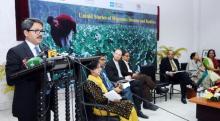Speech for Hon’ble State Minister for Foreign Affairs at the Unveiling of book titled “Untold Stories of Migrants: Dreams and Realities” 24 January 2016, 1600 hours Senate Bhaban, Dhaka University

Distinguished Guests
Ladies and Gentlemen
Assalamu Alaikum and Very Good Afternoon,
I am delighted to join you all here today. Let me express my thanks to Refugee and Migratory Movements Research Unit (RMMRU) for their efforts to bring out the publication titled “Untold Stories of Migrants: Dreams and Realities’.
I had the chances to glance through the volume. I must appreciate; RMMRU has made a sincere endeavor in collating and presenting 150 migrants’ stories in a compilation format. The story of a migrant’s life is never an ordinary one. The book has aptly captured the great achievements of our migrants and at the same time the pains and agonies they and their families endure. Some of the statements of the migrants reflect their true perceptions about migration and their analysis in loss and gain not only by economic indicators but also in social parameters. There are narratives cited in the book that depict the successes, vulnerabilities more particularly in women migration.
Ladies and Gentlemen,
Today, migration has been perceived as one of the important drivers of the global economy. Migration contributes in stabilizing global labor market, facilitating knowledge and ideas as well as sustaining economic fundamentals. Human mobility is increasingly being seen as an effective means of development along with movement of capital and freight across the borders. The positive contribution of migrants to inclusive growth and sustainable development has been positively surfaced in the global outcome documents including the Agenda 2030, Addis Ababa Action Agenda, Paris Agreement and Sendai Framework.
In case of Bangladesh, the contributions of migration and migrants are ensuring sectoral growth of economy. For us, migration is not only about creating opportunities to secure employment; it helps in nation building through contributing to our foreign reserve that recently exceeded US $32 billion. Migrations’ impact on the reduction of poverty is also significant.
The government of Bangladesh has been maintaining its steady positive policies to ensure that the rights and dignity of our migrants should be preserved and promoted both in the country and abroad. In this spirit, the current government under the strong visionary leadership of Prime Minister Shiekh Hasina has undertaken proactive roles in different multilateral foras to ensure the welfare of migrants and their families. It is our government that already has taken projects to mainstreaming migration into the development agenda. The government has also undertaken different series of means in this regard like the enactment of ‘Overseas Employment and Migrants Act 2013’ establishment of ‘Probasi Kalyan Bank’ etc. We are also working hard to reduce transaction costs for sending remittances. Our government is not only negotiating with the host countries to promote and preserve the interests of our migrants but also exploring newer destinations for sending our manpower.
Ladies and gentlemen,
Early last month, the 9th Global Forum on Migration and Development (GFMD) was hosted in Dhaka under Bangladesh’s Chairmanship. More than 1000 delegates from 125 countries, over 350 members of international civil society and representatives of 30 international organizations participated in this annual forum. A set of key recommendations especially, on the governance of migration were arrived at 9th GFMD Summit. Issues like the economics of migration and the sociology of migration were also the key focus areas for discussion in the forum – bringing all the relevant stakeholders together.
All of us are aware about the sorrows and sufferings of migrants worldwide. Only in year 2015, around 4300 undocumented migrants faced tragic death while crossing the Mediterranean Sea. Many of our fellow citizens had similar misfortune while heading towards Thailand, Malaysia or some other European countries in search of a better life. You will be happy to know that Bangladesh has been working hard to facilitate safe, orderly and regular migration worldwide under an effective and coherent governance structure. The role of Bangladesh has been instrumental in spearheading the idea of a ‘Global Compact’ on migration. Bangladesh was the first to make such proposal to the United Nations. This compact will be implemented in 2018 after two years thorough discussion by global stakeholders.
Distinguished guests,
As I conclude, let me thank RMMRU once gain for compiling the narratives of our migrant workers from its various research initiatives. I firmly believe the stories will not only help the migration researchers but also the policy makers to gain important insights on the issue. Let us all work to ensure safer and prosperous future of our migrants.
I thank you all.








